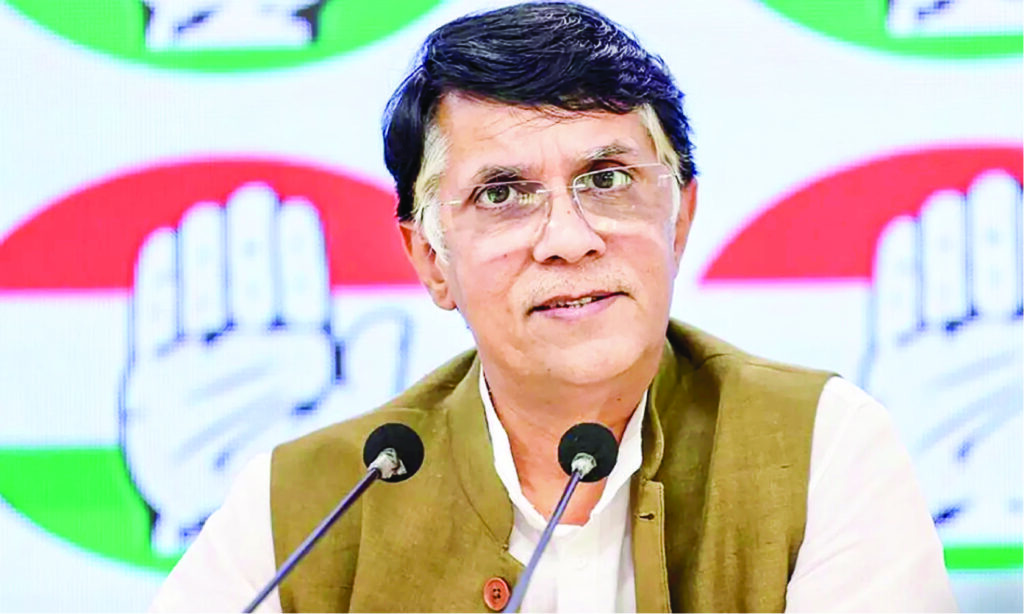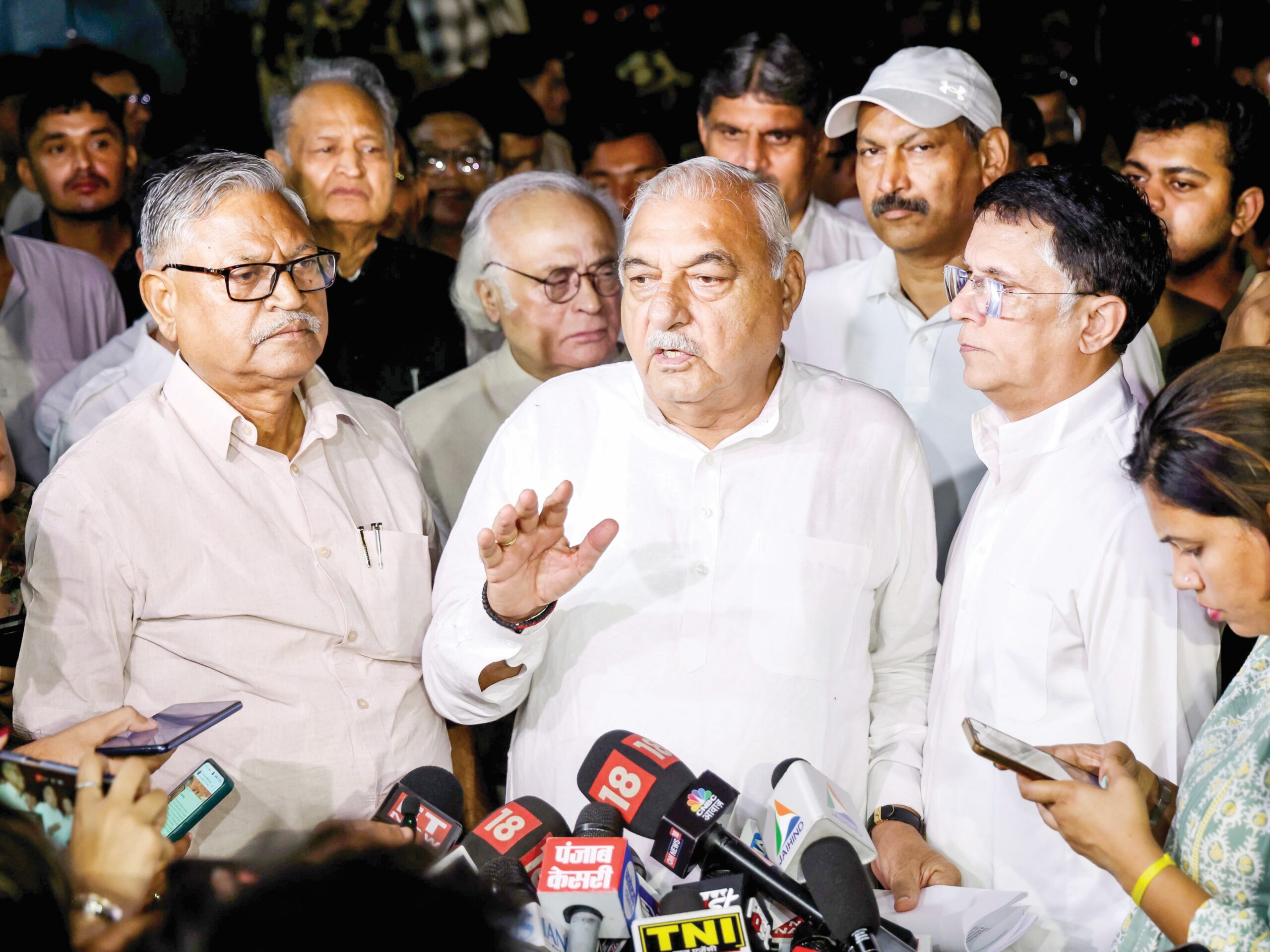Internal dissent and rebellion within Congress cost the party dear in the Haryana Assembly elections, where disgruntled leaders who were denied tickets played a spoiler’s role, leading to defeat on more than 15 key seats.
According to election data and internal assessments, Congress managed to secure 37 seats, falling short of the 46-seat majority mark, as rebel candidates siphoned crucial votes-putting a question mark over the ground surveys being conducted by the party to find out best candidates.
A study on party’s performance revealed that the Congress lost significant ground in constituencies such as Pundri, Rai, Gohana, Safidon, Dadri, Tigaon, Ambala Cantt, Assandh, Uchana Kalan, Badhra, Mahendergarh, Sohna, Dabwali, and Bahadurgarh, all due to vote splits caused by disgruntled leaders. In many instances, the rebels secured between 10,000 and 40,000 votes, surpassing the margin by which the Congress candidates were defeated and even remained at the second position pushing the party candidates at third or fourth position.
In Bahadurgarh, for example, Congress rebel Rajesh Joon won as an Independent with a staggering margin of 41,999 votes, while the official Congress candidate, Rajinder Joon, finished a distant third with just 28,955 votes. Similarly, in Ambala Cantt, Congress rebel Chitra Sarwara garnered 52,581 votes, finishing second behind BJP’s Anil Vij, who secured 59,858 votes. Congress’s official candidate, Parvinder Pari, was left far behind with only 14,469 votes.
A particularly humiliating defeat occurred in Ballabgarh, where Congress bypassed former MLA Sharda Rathore, opting for a surprise pick, Parag Sharma, who ended with just 8,674 votes, coming in fourth. Rathore, contesting as an Independent, secured 44,076 votes. In Tigaon, a similar situation unfolded when former MLA Lalit Nagar, denied a Congress ticket, ran as an Independent and secured 56,828 votes, finishing second. The party’s official candidate, Rohit Nagar, was trounced by BJP’s Rajesh Nagar, who won by a massive margin of 72,573 votes.
Also, the Congress’ formula of “Sitting-Getting” to field all sitting MLAs again cost the party heavily as out of 28 sitting MLAs the party has lost 15 out of 28 seats on which it fielded sitting MLAs.
These defeats raise serious questions about Congress’s ticket distribution strategy, which the party had earlier claimed was based on “winnability” through ground surveys.
Despite these setbacks, Congress leader Rahul Gandhi acknowledged the unexpected results and vowed to analyze the reasons behind the party’s defeat. “We are analyzing the unexpected results of Haryana. We will inform the Election Commission of the complaints coming from several assembly constituencies. A heartfelt thank you to all the people of Haryana for their support and to our brave lion-hearted workers for their tireless efforts. We will continue this struggle for rights, social and economic justice, and truth,” he posted on X (formerly Twitter).
Adding to Congress’s woes, the decision not to form an alliance with the Aam Aadmi Party (AAP) also proved costly. Analysts suggest that had Congress allied with AAP, the party could have won at least six additional seats. For instance, in Assandh, Congress candidate Shamsher Gogi lost by a slim margin of 2,306 votes to BJP’s Yoginder Rana, while AAP candidate Amandeep Jundla captured 4,290 votes, which could have changed the result. In Dabwali, Congress’s Amit Sihag lost by only 610 votes to BJP’s Aditya Devilal, while AAP’s Kuldeep Singh Gadrana received 6,606 votes.
Though AAP once again failed to open its account in Haryana, its candidates received a total of 1.79% of the votes, enough to affect the outcomes in multiple constituencies. The gap between BJP and Congress in terms of vote share was just 0.85%, underscoring how even a small alliance with AAP could have tipped the scales in Congress’s favor.
Taking a jab at Congress for rejecting an alliance, senior AAP leader Raghav Chadha posted a cryptic yet poetic message on X in Hindi: “If they had cared about my desires, it would have been a different story. If they had considered my longing, the evening would have been something else. Today, they must be regretting leaving me behind. Had we walked together, it would have been a different story.”
As per the political observers the Congress’s disappointing performance in the face of internal divisions and missed alliance opportunities highlights the challenges the party faces in regaining its political footing in Haryana.
Complaints lodged with Election Commission

“The Election Commission has assured us that they will investigate our concerns and respond after consulting the returning officers from each constituency. — Pawan Khera
CHANDIGARH: Stunned by the Haryana Assembly Elections results, the Congress party has lodged a formal complaint with the Election Commission of India (ECI) alleging irregularities in the vote counting process for 20 Assembly seats. Congress leaders Bhupinder Singh Hooda and Pawan Khera expressed their disbelief over the party’s unexpected defeat in an election that many had anticipated would result in a Congress victory. They have indicated that complaints regarding an additional 13 constituencies will be submitted to the poll body in the coming days.
In a press briefing after their meeting with ECI officials, Khera stated, “The Election Commission has assured us that they will investigate our concerns and respond after consulting the returning officers from each constituency. We have already presented documentation of our complaints concerning 20 assembly constituencies, and we will provide additional complaints from 13 more within the next 48 hours.”
Hooda, the former Chief Minister of Haryana, remarked on the surprising nature of the election results, noting that initial counts of postal ballots had shown Congress leading in several areas. However, as the counting of Electronic Voting Machines (EVMs) commenced, the party began to lag. He emphasized, “These results are surprising because everyone expected Congress to form the government in Haryana, according to intelligence reports and surveys. Yet, when the counting of EVMs began, we fell behind. We have received numerous complaints regarding delays in the counting process in several places, and the Election Commission has assured us they are looking into all the issues.”
The Congress delegation, which included senior leaders like Ashok Gehlot and K C Venugopal, presented specific complaints about the electoral process, highlighting significant discrepancies. Khera noted, “We brought to the Commission’s attention that there were seven assembly segments where our candidates reported EVM batteries showing 99% charge on the morning of counting day. This is impossible because those batteries had been used throughout the polling day and stored in a strong room afterward. It is unnatural for them to maintain such high battery levels after so many days.”
Despite their concerns, Khera expressed frustration with the ECI’s response, saying, “Their reaction was, as usual, a good smile and a good cup of tea, but we need more than that. We demand concrete answers backed by evidence. What does the BJP have to do with this? This is a matter between the Opposition and the Election Commission of India.”
In a letter sent to Congress Chief Mallikarjun Kharge earlier today, the Election Commission acknowledged the remarks made by Congress leaders, including Leader of the Opposition in the Lok Sabha, Rahul Gandhi, who described the Haryana election results as “unexpected” and called for a thorough analysis of the polls.
“Assuming that the statement from the Party President reflects the formal stance of the party regarding the electoral results, the ECI has agreed to meet with the delegation today at 6 PM,” the letter stated by the principal secretary
of the ECI, NT Bhutia, referred to the assertions made by Congress leaders “We will ensure that all claims are thoroughly investigated and addressed”, he stated.
The Congress party’s concerns come in the wake of a historic performance by the BJP in the Haryana Assembly polls, where it secured 48 seats, allowing the party to form the government for a third consecutive term-proving all the pollsters and exit polls wrong. The unexpected outcome has prompted the Congress to question the integrity of the electoral process, as they gear up to challenge the results.







